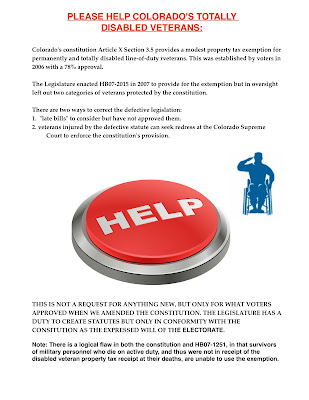If a disabled vet isn't already in receipt if the property tax exemption, the survivor is forever forbidden this important benefit. The system is set up so that widows and widowers of troops killed in the line-of duty will never get the benefit. (click for Gold Star Families' blog on this)
Colorado's "PROPERTY TAX EXEMPTION FOR THE SURVIVING SPOUSE OF A PREVIOUSLY QUALIFIED DISABLED VETERAN" form explains that the widow or widower of a totally and permanently 100% service-connected veteran:
"The veteran to whom the applicant was married must have applied for and been granted the disabled veterans property tax exemption as provided by § 39-3-203(1.5)(a), C.R.S., prior to his or her death" (Colorado CMDVA Form 15-DPT-AR DV-002-07/14)Very clearly, CMDVA's form discourages widows from applying unless the veteran was already receiving Colorado's disabled veteran property tax exemption. This is even though no prohibition can be found in the constitution or the state's laws as regards the veteran's receipt before death.
Other confusing barriers pop up to frustrate Colorado's most disabled veterans and their survivors. Colorado's constitution spells out the exemption's qualification requirements, but as this blog has carefully detailed, legislation enacted in 2007 to accommodate Referendum E (which became Article X Section 3.5 of the constitution) didn't properly address two vital provisions in the constitution:
(1) HB07-1251 left out the constitution's provision for totally disabled military retirees, and (2) the Division of Military Affairs added somehow a barrier to VA's Permanent and Total Individual Unemployability (TDIU.)Vets who've been around the block with the US Department of Veterans Affairs will tell anyone asking how slow the VA is in making its disability awards. Even the simplist 100% disability rating can take years following the initial injury while on duty. Following the Gulf War, this writer was retired by the Air Force with a permanent and total 100% service connected disability military retirement effective in 1996, yet the VA 100% service connected rating didn't follow until 2015! Thus, Colorado denied its tax exemption even though the constitution clearly provides for it. Further, Colorado refused to recognize the VA's TDIU rating dating from 1998,
Were I to have died from my Gulf War injuries or at any time from 1991 until my VA rating came through in 2015, my widow would be forever denied the exemption regardless of my clear eligibility.
 Colorado has been doing this to hundreds of disabled veterans' widows and widowers (Gold Star families) since 2007 when HB07-1251 was signed by the governor. For nine years, we have refused the tax exemption to survivors whose veterans were qualified by military disability retirements or TDIU VA disability ratings. Colorado also refuses it to active duty personnel who die in service because, obviously, they never were able to apply for the exemption and thus, their widows are refused.
Colorado has been doing this to hundreds of disabled veterans' widows and widowers (Gold Star families) since 2007 when HB07-1251 was signed by the governor. For nine years, we have refused the tax exemption to survivors whose veterans were qualified by military disability retirements or TDIU VA disability ratings. Colorado also refuses it to active duty personnel who die in service because, obviously, they never were able to apply for the exemption and thus, their widows are refused.Does this make sense, after reading the Blue Book's comprehensive description of the goal for Referendum E, or does it make sense after reading Article X Section 3.5 of the constitution? The answer should be no. CMDVA's interpretation of the statute, even though it seems in step with the constitution, has drifted far from what the electorate approved by a 78% margin in the 2006 election.
Until a more compassionate program is established, this year's' military widows will join the ranks of those between 2007 and 2016 in being refused this vital, well-earned benefit.










